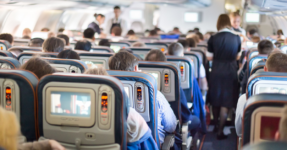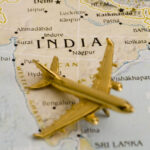The Law, Penalties and Defences for Offensive or Disorderly Conduct on an Aircraft

A New Zealand man has been placed on a good behaviour bond after exposing himself and urinating on the floor of an aircraft during a flight from Bali to Brisbane.
Police say the 72-year old man consumed a number of small bottles of wine during the flight and was sitting in his seat, before opening his trousers and relieving himself on the floor of the plane.
The man was charged with ‘offensive or disorderly behaviour on aircraft’.
He pleaded guilty in Brisbane Magistrates Court and was given a 12-month good behaviour bond.
Offensive or disorderly conduct on an aircraft
Offensive or disorderly conduct on an aircraft is an offence under regulation 91.525 of the Civil Aviation Safety Regulations 1998 (cth) which applies across the nation.
To establish the offence, the prosecution must prove beyond reasonable doubt that:
- You behaved in an offensive or disorderly manner,
- You did so on an aircraft, and
- The result of your behaviour was that the safety of the aircraft or those on it were endangered.
It is certainly questionable whether the passenger’s conduct endangered the aircraft’s safety or those on it, yet he pleaded guilty regardless.
Power to refuse boarding
Subsection (2) of the regulation proceeds to state that the operator or a crew member of an aircraft for a flight may refuse to allow a person to board the aircraft if there are reasonable grounds to believe that the person is likely to behave in an offensive or disorderly manner that is likely to endanger the safety of the aircraft or persons on the aircraft.
Meaning of offensive or disorderly conduct
Subsection (3) of the regulation provides that a person is taken to behave in an offensive or disorderly manner if he or she:
(a) assaults, intimidates or threatens another person (whether the assault, intimidation or threat is verbal or physical, and whether or not a weapon or object is used); or
(b) intentionally damages or destroys property.
The penalties
The maximum penalty for the offence is 50 Commonwealth penalty units, which are currently $222; which means the maximum penalty is a fine of $11,100.
Legal defences
It is important to be aware that if you are able to raise evidence of a legal defence, the onus shifts to the prosecution to prove beyond reasonable doubt that the defence is not available in the circumstances.
Legal defences to the charge include necessity and duress.
Alcohol on planes
Research suggests that alcohol can have a greater impact on the human body at altitude than on the ground, so it’s wise to take it easy.
Any passenger who is intoxicated prior to boarding a flight, will not be permitted on board. However, getting drunk on board once the aircraft is in the air, is only an offence if you begin to behave in an offensive or unruly way so as to jeopardise the safety of the flight or those on board.
Captain has powers of arrest
It is equally important to be aware that once a flight is in the air, the Captain has powers equivalent to law enforcement agencies on the ground.
In fact, he or she has the power to place any person on board under arrest if they threaten the safety of the aircraft, the crew or the passengers on board.
The lawful exercise of this power empowers the crew to exercise reasonable force to retrain the person reasonably suspected of committing the offence, and the exercisable jurisdiction is considered to be the place of the next landing.
The world’s most litigious jurisdiction
In the United States, lawsuits against airlines and flight attendants for over-serving passengers are on the rise.
Several lawsuits have alleged that alcohol played a role in sexual harassment on and off the plane, driving under the influence of alcohol (DUI) incidents, and even domestic violence offences after the plane had landed safely and passengers had disembarked.







